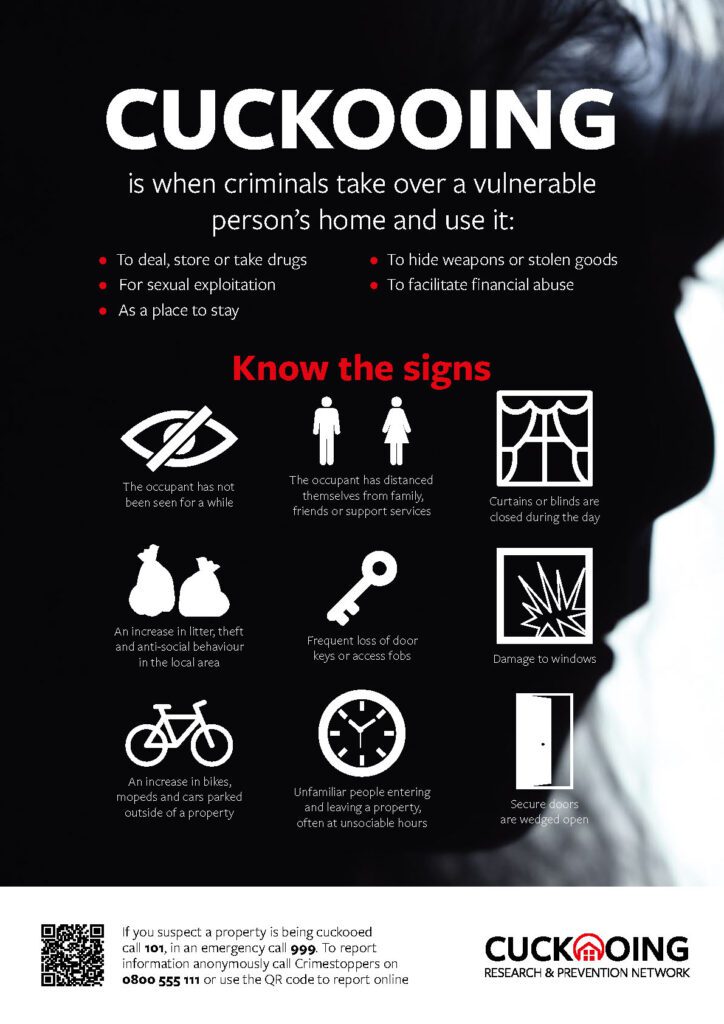CUCKOOING FINALLY RECOGNISED AS STANDALONE OFFENCE
THE CONFIRMATION THAT CUCKOOING IS FINALLY TO BE RECOGNISED AS A STANDALONE OFFENCE IS WELCOME NEWS, BUT WHAT IS ‘CUCKOOING’? THE LITTLE-KNOWN ILLEGAL ACTIVITY HAS LONG BEEN AN ISSUE AT THE HEART OF COUNTY LINES NETWORKS IN THE UK AND WE’RE INTERESTED TO SEE WHAT THIS NEW DEVELOPMENT MIGHT MEAN FOR POLICING, PROSECUTIONS, AND COMMUNITIES DEALING WITH GANGS AND CHILD CRIMINAL EXPLOITATION, AS WELL AS THE VICTIMS THEMSELVES. WILL IT BE ENOUGH?
What exactly is ‘cuckooing’?
Cuckooing is essentially when criminals take over a vulnerable person’s property for illegal activity. There are lots of different types of cuckooing. Some examples include:
- Using a property to deal, store or take drugs.
- Using a property to deal or store weapons.
- Using a property for sex work.
- Taking over a property as a place for others to occupy.
- Taking over a property to financially abuse the resident.
How can you tell if a home has been cuckooed?
Key signs to look out for include:
- An increase in the number of visitors to the property through the day and night, often visiting for only short periods of time.
- An increased number of vehicles outside the property including taxis or hire cars.
- The usual occupier of the property having new associates staying and bags of clothing and / or extra bedding in the property.
- The occupier moving out or staying away from the property whilst an unknown person remains.
- Evidence of drug use such as discarded syringes, foil and cling film in and around the property and evidence of drug dealing such as scales and deal bags.
- An increase in local crime and anti-social behaviour, including the accumulation and storage of stolen pedal cycles.
- Victims of cuckooing may disengage from support services and be unwilling to discuss what is happening at their property when the subject is raised with them.
Reporting of cuckooing is relatively low across the UK, and a contributing factor in this is because cuckooing itself is not considered a standalone crime. Therefore, police do not have laws at their disposal to arrest and charge for cuckooing alone. Temporary restrictions can be placed on a property due to anti-social beaviour, but these only displace the issue and the organised crime gang will typically just move elsewhere. Convictions for cuckooing have so far only come about when further criminal activity has also been discovered.
Victims of cuckooing are very often intimidated and controlled by their abusers and are too afraid of them to come forward themselves. The long-term repercussions for these victims, and the substantial trauma they have experienced cannot be underestimated.

What is the law change?
Following campaigning by the Centre for Social Justice, an amendment to the Criminal Justice Bill has been announced by the Home Secretary and part of this is the criminalisation of cuckooing. A lot of other practices linked to cuckooing have long been criminalised, so it is bizarre to consider why it has taken so long for legislation specifically around cuckooing to catch up. The law has not been changed yet, but the change is at least in progress and there is cross-party support from many MPs.
You can read the Centre for Social Justice’s statement on the amendment here.
Is it too little, too late?
Certainly, more conversations around cuckooing are a good thing. Better awareness will help communities recognise when vulnerable individuals and households have been exploited, and support services will be able to work with the police and step in sooner. The law change itself will greatly reduce how organised crime groups are able to operate behind closed doors. They will be forced to deal in more public spaces where the risk of arrest is greater. If it is easier to prosecute for cuckooing offences, then widespread disruption to established county lines and sexual exploitation networks is far more likely and Gamechanger hopes this will translate to a reduction in cases of CCE in the UK. Cases can also be recorded and used as statistics in the analysis of crime that informs policing and crime plan decisions.
Yet it is frustrating that it has taken 8 years of campaigning and high-profile TV dramas such as Line of Duty and Happy Valley to build enough awareness and pressure to have this law debated in the House of Commons. Throughout this time, vulnerable people have become victims of a horrific practice and organised crime – particularly associated with County Lines – has become more widespread and many more young people have been exploited.
What next?
These steps to criminalise cuckooing as a standalone offence may have taken too long, but at least things now look more promising. At Gamechanger, we think this is the first step in recognising a 3D picture of those exploited by County Lines drugs gangs and other criminal operations. Only then can proper victim support and prevention programmes be put in place.
Our facilitators work tirelessly to raise awareness of issues such as cuckooing through our IMPACT, INTERVENTION and INFORM workshop sessions, and we hope to reach some of those most vulnerable to exploitation, as well as adults who safeguard those people. Together, through legislation – and also through Gamechanger’s unique interventional education programmes – we can prevent cuckooing and other horrific exploitational practices that remain rife across the UK.
Please take a look at the links to our programmes below or contact us here to arrange a call.

